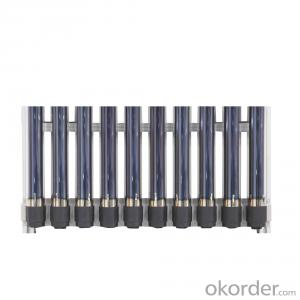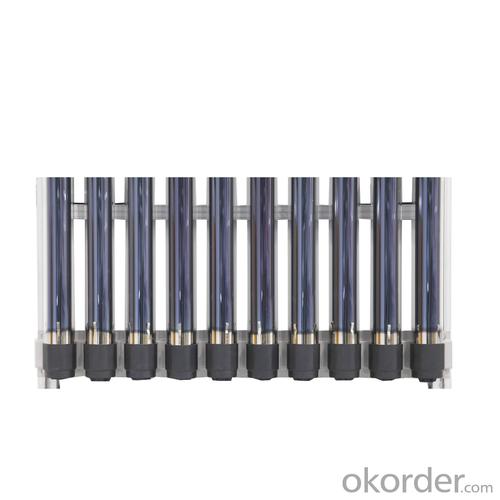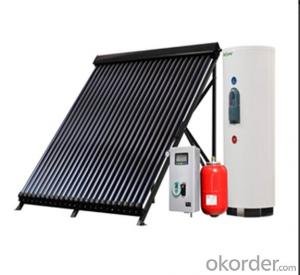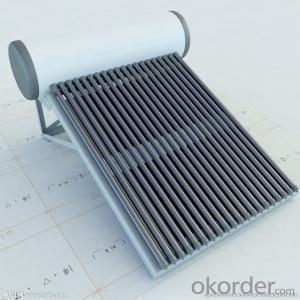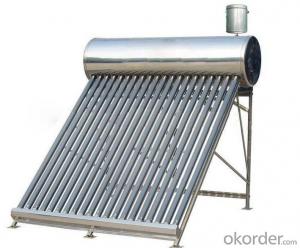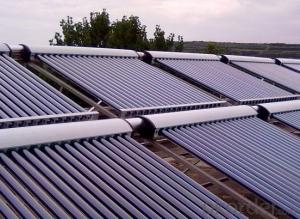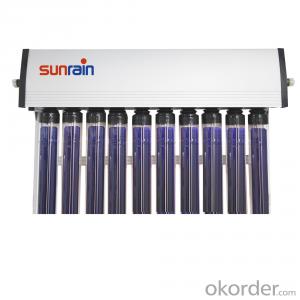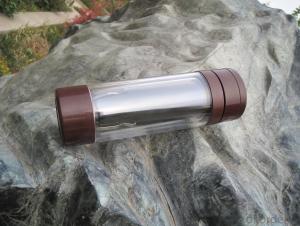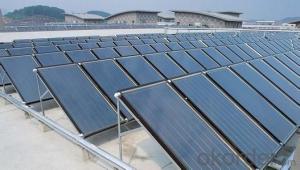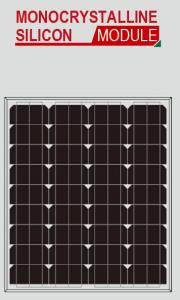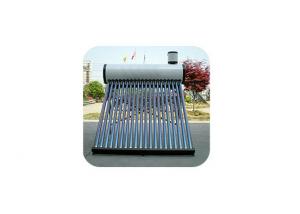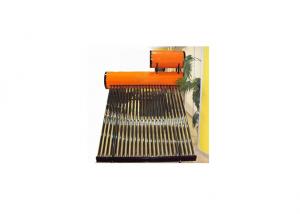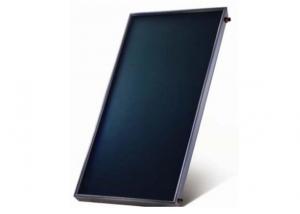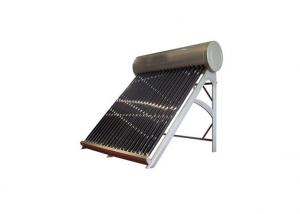Bestway Multifunctional Heat Pump Pool Solar Water Heater
- Loading Port:
- China Main Port
- Payment Terms:
- TT OR LC
- Min Order Qty:
- -
- Supply Capability:
- -
OKorder Service Pledge
Quality Product, Order Online Tracking, Timely Delivery
OKorder Financial Service
Credit Rating, Credit Services, Credit Purchasing
You Might Also Like
| Type | Multifunctional /Domestic |
| Heating capacity | 5.0kw~21kw |
| COP | ≥3.5 |
| Rated water temp. | / |
| Running ambient temp. | -25~43℃ |
| Compressor | Rotary |
| Refrigerant | R410a |
| Power supply | 220-240~/50/1 |
| Certification | CE |
Features
High efficiency DC inventer compressor of famous brand.
EEV optimize the refrigerant flow.
Wide working temperature range down to -25℃.
Water pump inside.
Intertek efficiency testing report proves its high COP.
With compressor crankcase heater and bottom plate heater.
- Q: Can a solar water heater be used in areas with limited access to skilled technicians for maintenance or repairs?
- Yes, a solar water heater can be used in areas with limited access to skilled technicians for maintenance or repairs. Solar water heaters are generally designed with simplicity and durability in mind, making them easy to operate and maintain. They have fewer moving parts compared to conventional water heaters, reducing the chances of breakdowns or malfunctions. Additionally, solar water heaters are built to withstand harsh weather conditions, making them suitable for remote or rural areas with limited resources. Routine maintenance requirements are often minimal, primarily consisting of cleaning the solar panels and checking the fluid levels. These tasks can usually be performed by the end-user with basic instructions provided by the manufacturer. Furthermore, many manufacturers offer user-friendly manuals and online resources to assist individuals in troubleshooting common issues or conducting minor repairs. In case of major repairs or technical problems, the manufacturer can often provide remote support or guidance through phone or email communications. Overall, while having limited access to skilled technicians may pose some challenges, solar water heaters are designed to be low-maintenance and user-friendly, making them suitable for use in areas with limited technical support.
- Q: Can a solar water heater be used in areas with high levels of dust or sand?
- Yes, a solar water heater can be used in areas with high levels of dust or sand. However, regular maintenance and cleaning may be required to ensure optimal performance and prevent any obstruction or damage to the system.
- Q: Can a solar water heater be installed without a storage tank?
- No, a solar water heater cannot be installed without a storage tank. The storage tank is a crucial component that allows for the collection and storage of heated water from the solar panels. Without a storage tank, the system would not be able to store and distribute hot water effectively.
- Q: In the market to see the next, solar energy is also a lot of brands are also many. Look, what kind of solar energy is good?
- Now some brands of solar energy, electric water heater auxiliary heating module, so do not worry about the lack of sunshine in winter.2, to suit their own situation: if you do not live on the top floor, you can buy that can be installed on the balcony of the solar energy, what is called balcony wall.
- Q: What are the different storage options available for solar water heaters?
- There exist multiple storage options for solar water heaters, each with its own advantages and considerations. The following are the most prevalent types of storage options for solar water heaters: 1. Solar Storage Tanks: These tanks are the most basic and traditional storage option for solar water heaters. Typically constructed of insulated steel or glass-lined steel, they can hold a substantial amount of hot water. Solar storage tanks are generally installed alongside the solar collectors and are directly heated by the sun. They are suitable for both residential and commercial use. 2. Heat Exchanger Tanks: These storage tanks contain an additional heat exchanger coil. The solar collectors heat a fluid that flows through the heat exchanger coil, transferring the heat to the water stored in the tank. This enables more efficient heat transfer and is particularly beneficial in colder climates. 3. Pumped Systems: Pumped systems involve pumping the heated water from the solar collectors into a separate storage tank positioned at a higher elevation than the collectors. This creates a natural gravity flow system, eliminating the need for electricity to circulate the water. Pumped systems are commonly employed in remote areas with limited or unreliable electricity supply. 4. Integrated Collector Storage (ICS) Systems: These systems combine the solar collector and storage tank into a single unit. The water is directly heated within the collector and then stored inside it. ICS systems are typically used in warmer climates and are suitable for smaller-scale applications such as residential homes. 5. Drainback Systems: Drainback systems employ a separate storage tank to hold the water. However, instead of maintaining pressurization, the water drains back into the tank when not in use. This prevents freezing or overheating of the system, making it ideal for areas with extreme temperature variations. It is essential to consider various factors such as climate, available space, system efficiency, and budget when selecting a storage option. Seeking guidance from a solar water heater professional can assist in determining the most appropriate storage option for specific requirements.
- Q: How does the location of the solar water heater affect its efficiency?
- The location of a solar water heater can significantly impact its efficiency. Ideally, solar water heaters should be positioned in areas that receive ample sunlight throughout the day. Placing the heater in a location with direct and unobstructed access to sunlight will ensure maximum efficiency. If the solar water heater is installed in a shaded area or in a location where it is frequently blocked by trees, buildings, or other structures, it will receive less sunlight and therefore produce less heat. This can lead to reduced efficiency and lower water temperatures. Furthermore, the orientation and tilt angle of the solar collector can also affect its efficiency. In the northern hemisphere, for example, the collector should face south to maximize sun exposure. The tilt angle should be adjusted to match the latitude of the installation site. Incorrect orientation or tilt angle can result in reduced efficiency as the collector may not receive optimal sunlight. Additionally, the location's climate can impact the efficiency of the solar water heater. Areas with more sunshine and higher average temperatures will generally yield better results. Cold climates or regions with frequent cloudy days may experience decreased efficiency as the solar collector may struggle to generate enough heat. In conclusion, the location of a solar water heater is crucial for its efficiency. Placing it in an area with ample sunlight, minimal shading, correct orientation, and tilt angle will maximize its performance and ensure optimal water heating capabilities.
- Q: The house is ready to install a solar water heater, but do not know what kind of good do not know how to distinguish between bad? Here's a home called "God" brand, do not know how this brand? Want to know friends with us!! thank you!.....
- At present, the domestic solar water heater market sales of a wide range of solar collector, in accordance with the type to distinguish, can be divided into the vacuum tube and the plate; in accordance with the structure of distinction can be divided into integral and split; in accordance with the production process division, can be divided into pressure and non pressure. At present, most of the domestic solar water heaters sold in the market are mostly non pressure vacuum tube type solar water heater. When we buy domestic solar water heater, we should pay attention to the following points:
- Q: Can a solar water heater be used in areas with limited access to sustainable energy policies?
- Yes, a solar water heater can be used in areas with limited access to sustainable energy policies. Solar water heaters rely on the sun's energy to heat water, making them a sustainable and renewable option regardless of the local energy policies. They can provide hot water without the need for electricity or traditional fuel sources, making them a viable solution for areas with limited access to sustainable energy resources.
- Q: Are there any maintenance requirements for a solar water heater?
- Yes, solar water heaters do require some maintenance. It is important to regularly inspect and clean the solar panels to ensure they are free from dirt or debris that could hinder their efficiency. Additionally, the system's pumps, valves, and controls should be checked periodically for any signs of malfunction or leaks. Flushing the system annually to remove mineral deposits and checking for any potential leaks in the plumbing connections are also recommended maintenance tasks for a solar water heater.
- Q: Can a solar water heater be used in areas with building restrictions?
- Yes, a solar water heater can generally be used in areas with building restrictions. Solar water heaters are considered environmentally friendly and energy-efficient, which makes them an attractive choice for many homeowners and businesses. However, it is important to check the specific building restrictions and obtain any necessary permits or approvals before installing a solar water heater in such areas.
Send your message to us
Bestway Multifunctional Heat Pump Pool Solar Water Heater
- Loading Port:
- China Main Port
- Payment Terms:
- TT OR LC
- Min Order Qty:
- -
- Supply Capability:
- -
OKorder Service Pledge
Quality Product, Order Online Tracking, Timely Delivery
OKorder Financial Service
Credit Rating, Credit Services, Credit Purchasing
Similar products
Hot products
Hot Searches
Related keywords
